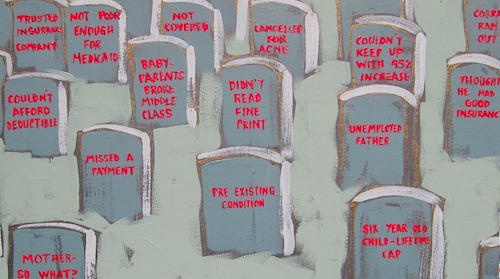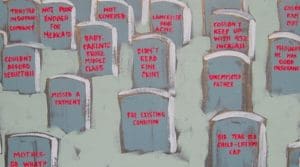
08 May Chronically Ill People Say Repeal Vote is a Death Sentence
SAN FRANCISCO – In 2011, San Diego resident Spike Dolomite found out she had late stage breast cancer. She and her husband were “cash poor and only a miracle could save me,” she said to herself at the time.
Luckily for her, the Affordable Care Act allowed her to aggressively treat her breast cancer and send it into remission. Her coverage allows her to continue to be monitored by her doctors and live a normal life.
Now, like millions of other people across the country, she’s terrified she’ll become uninsured again. On May 4, the House voted 217-213 to gut the ACA, making health insurance unaffordable to an estimated 24 million people nationwide, 4 million of them in California.
Not one Democrat supported the repeal. The bill now heads to the Senate, where political pundits say its chances of passing are more challenging.
“I may have to live the rest of my life uninsured, with the ongoing threat of a reoccurrence of my cancer,” she said. “If my cancer returns, I could die from it. Killing Obamacare will kill people. I don’t want to be one of them.”
Among other things, the Americans Health Care Act (AHCA), the bill crafted by the Trump administration to replace the ACA, would eliminate the financial assistance that helps lower-income people with out-of-pocket costs such as deductibles and co-pays, radically restructure Medicaid (Medi-Cal in California) by rolling back the expansion under ACA and make it difficult, if not impossible for those with chronic or serious health conditions to get coverage.
All 14 of California’s Republican members of Congress voted in favor of the AHCA. Some of them – Tom McClintock, R-Elk Grove, Jeff Denham, R-Turlock, David Velado, R-Hanford, Devin Nunes, R-Tulare, Keven McCarthy, R-Bakersfield and Darrel Issa, R-Vista — represent Central Valley districts, whose residents have the most to lose by a repeal because of widespread poverty among them. A large percentage of them depend on Medi-Cal, the state’s version of Medicaid, an insurance program for low-income people. The AHCA would phase out the expansion of Medi-Cal and significantly reduce funding for the program.
About one-third of the state’s children depend on Medi-Cal.
Children Now’s President Ted Lampert called yesterday’s vote, without a Congressional Budget Office (CBO) analysis, “irresponsible.”
“California’s kids will suffer if the Senate doesn’t block this dangerous bill,” observed Lampert.
Scores of other health care advocates weighed in with equally sharp criticism of the House action.
“It is particularly shocking that this momentous decision comes without the CBO estimate of the human and financial costs, even though that information is expected in a matter of days,” said Sandra Hernandez, president of the California Health Care Foundation.
In anticipation of a major disruption in the health care landscape by the Trump administration, and determined to remain in the forefront of health care, advocates in California are pushing for a budget proposal to continue on what it set in motion last year: providing comprehensive Medi-Cal to some 183, 000 children under 19, including those who are undocumented. Advocates now want to expand the Health for All Kids program and provide full-scope Medi-Cal to young adults between the ages of 19 and 26.
They say that at least 80,000 more lives in California will change if their proposal goes through. Like the Health for All Kids program, the proposed program will be also be funded by the $2 hike in tobacco tax voters approved last year.
Gustava Herrera, western regional director of the eight-year-old group, Young Invincibles, pointed out that aside from giving young people their right to access health care through HFYA, it makes economic sense to have such a program.
“Young adults are the largest group of uninsured in the country,” Herrera said. “They visit the emergency room more than any other group except seniors.”
Last month, a controversial and expensive proposal to create a government-run single-payer health care system passed its first hurdle in the state legislature. The Healthy California Act, co-authored by Senators Ricardo Lara, D-Bell Gardens, and Toni Atkins, D-San Diego, will cover everyone – from undocumented residents to Medi-Cal and Medicare recipients, as well as employees who get their insurance through work. The bill sailed through the Senate Health Committee and is now before the Senate Appropriations Committee.
The single-payer health care system essentially allows people to not have to buy health insurance and pay for premiums. But it would force them to pay higher taxes, the money from which will be used to fund the insurance plan – similar to the way the United States runs its Medicare program for those 65 and older.
Although the AHCA is far from being a done deal, Anthony Wright, executive director of Health-Access, a statewide health advocacy group, said that the $24 billion cut to Medi-Cal each year under the AHCA would make the dream of getting universal health care in California that much harder.
“If we still have the ACA platform, it would be so much easier to get health care for all Californians,” he said.







No Comments